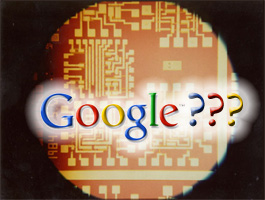
Innovative SearchingA couple of columns back -- I wrote, "Google is Great!" I was leading up to this column, which I began a few weeks ago but hadn't yet finished. Google's innovative and nonlinear approach to business has propelled it to a very lofty position at the top of the search engine "food chain." This achievement is due to their ability to think outside of the box and create a loyalty among advertisers, content providers and Internet users -- that's quite an accomplishmnent.
The Early Search Engine Wars
I told my colleagues -- "whoever controls the searches will eventually control the web." Microsoft had ignored the web for many of the early commercial years and was just beginning to get seriously involved. MSN had not really emerged as a player. I began to study search engines and portals. Eventually I designed and participated in many "micro" or "niche" portals with various search capabilities and diverse databases. I still build small portals and I have continued observing this constantly changing market with a great deal of interest. When Google arrived on the scene, they gave the world a search engine with an almost uncanny ability to resist manipulation and an algorithm capable of sorting website relevancy with remarkable thoroughness and accuracy, which contrasted sharply with its competitors, who seemed totally caught off-guard. Google's services were quickly scooped up by AOL as well as other companies. Even the pre-eminent search portal Yahoo utilized Google results for a significant period of time. Google's adaptiveness was quite impressive. Google results could be incorporated seamlessly into any company's output. Whether they made money on this venture is unknown to me, but they certainly became the dominant force in the search market place. AdSense & AdWords -- Non-linear Business Model of Perpetual Revenue?
Google's AdSense is different. Google's AdSense output is text based paid advertising and is not tacky -- the ads display website suggestions that are mostly relevant to the keywords that have been searched. The AdSense integrates nicely within the ouput page -- they are identified so that user is aware of the regular returns as well as the AdSense returns. The AdSense advertisers buy the advertising by purchasing something known as AdWords -- the keywords that they would like their site associated with in a search. AdWords purchasers pay on a per click basis and set their own ceilings. Adword cost is dynamic -- almost auction-like, thus sometimes certain ad words cost more than at other times. Sharing the Wealth and Creating IncentiveThe other feature that makes the AdSense program so attractive, and pervasive is through Google's partnership with content based websites. Google has created a very efficient method to partner and share revenue with website operators. They allow the website operator to display customized and relevant AdSense output on their websites and if a visitor clicks on the ad, the content provider will get a few cents for that click. The AdSense program is useful because of its relevancy to the page content. For example we participate in the program and the advertising on each page of www.TheRandomTimes.com is useful and relevant to our visitors thanks to Google's system.This business model is efficient, because it allows Google and its advertisers to maximize their exposure throughout the web and at the same time it gives content providers and site operators the incentive to place their ads in efficient locations. Internet users don't find them intrusive -- no pop-ups, flash or animation. Local Focus...Another item that Google, as well as a number of search engines have launched or are developing, is local versions of their search engines. These products such as Yahoo Local and Google Local are attempting to break things down on a more micro or community level. Their results are still lacking in the relevancy success that their macro searches have finally acquired, but they seem to be improving. In many ways the local versions of their searches seem to be invading the territory of local "Yellow Pages" telephone books...Win, Win, WinThe Google AdSense business model is the first self-sustaining Internet based advertising model to be this successful. Many other click-thru models have been tried or are currently available but I doubt that any have been this friendly to the entire web community -- advertisers, site operators and site visitors."...no good idea goes uncopied..."As we all know in a capitalist environment, no good idea goes uncopied. The rise to prominence by MSN is not a surprise nor is Yahoo's development of their own Google-like search engine. Yahoo, MSN and Google realize that control of the Internet is at hand. Though Microsoft (MSN) has the deep pockets to outspend the others, the linear business model that dominates their philosophy may hinder their perception and performance among web users. MSN has removed the free submission form for adding websites to their search engine database. They now require a fee for listing websites in their search engine. This model has been tried before and has failed. They may make it work, but Internet searchers are not going to be content with a search engine that only displays websites that have paid for inclusion or ranking -- I have a feeling that MSN will continue following links and indexing linked websites anyway. As we all know some of the best websites on the web are those that began as a personal project or a non-profit endeavor with little or no marketing budget. The search engine with the most inclusions will dominate. That fact, combined with non-linear thinking gives Google the edge and Yahoo will be right next to them...Bibliographic Entry
Gigliotti, Lorenzo. "Google is Great!" The Random Times Volume 1. #22 (2005):
Home Click to The quixotic mind of Lorenzo Gigliotti All rights reserved © 2004 FG Enterprises, Long Beach, California |


